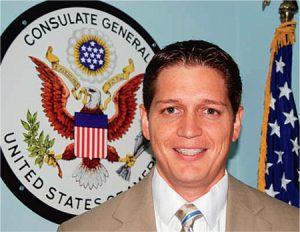An alum has come to understand the forces behind immigration, one person at a time.

At a U.S. Consulate in Mexico, Alexander Hawkes daily wrestled on a personal level with issues debated at a policy level in Washington.
Alexander Hawkes (BA ’99) has interviewed nearly 25,000 visa applicants hoping to visit the United States. As a vice consul in the U.S. consulate in Guadalajara, Mexico, Hawkes has had a unique opportunity to understand Mexicans’ perspective on border management and to build better relations between the United States and Mexico, person by person.
Preparation for this work began early for Hawkes, who has a native Chilean mother and who lived the first four years of his life in Mexico while his father studied medicine at the National Autonomous University of Mexico. Hawkes later served a mission in Panama and, after his BYU graduation, joined the Gallup Organization, where his interests in social issues and international politics expanded.
Before gaining his post at the consulate, Hawkes went through daylong oral and written exams, a thorough background check, and extensive training. “The U.S. Department of State wanted to know everything about me,” he says.
In his previous responsibilities at the consulate, Hawkes, who now works in the public-relations area, interviewed 120 to 160 applicants a day, sifting through the stories applicants gave to determine whether they intended to stay in the United States. Some desired to work in the United States, while others said they wanted to travel north for such reasons as family vacations, to pursue an education, or to visit a sick or disabled relative. It was Hawkes’ responsibility to recognize anyone who might cause harm to the United States or who might stay to live in the United States illegally. “I felt the weight of making the right decision, and sometimes the answer was no,” he says. “I had to get to the point where I was comfortable with the decisions I made during the day and could sleep at night.”
“For many people, a lot is on the line,” he explains. “Many of them enter the United States for employment and send their paycheck home in the form of remittances. Next to oil, this is the second-largest source of revenue in Mexico.”
Hawkes says the most popular request—a tourist visa—is also the most abused. “What we have experienced at the consulate is people who will tell us they want to vacation in the United States,” he says. “Once there, they get a job and stay. These are the illegal immigrants.”
Hawkes says the incentive to work in the United States is high. Forty percent of Mexico’s population is below the poverty level, and 25 percent are unemployed. The average worker in Mexico earns the equivalent of $100 per week, an amount that can be made in the United States in a day.
“Many, fortunately, do follow our immigration laws, find the American dream, and become wealthy,” he says. “They return to Mexico and start profitable businesses and serve in high-level government positions. Mexicans have labored in American fields for several decades. In many instances, it is expected when a male turns 16 or 17 that it is his turn to make the journey north.”
But immigration must happen legally, he says. The U.S. State Department’s motto is Secure Borders, Open Doors. “We want to encourage a friendly exchange between the two countries,” he says, “but we want people to go through the immigration process correctly.”









